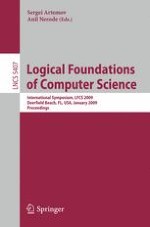This book constitutes the refereed proceedings of the International Symposium on Logical Foundations of Computer Science, LFCS 2009, held in Deerfield Beach, Florida, USA in January 2008. The volume presents 31 revised refereed papers carefully selected by the program committee. All current aspects of logic in computer science are addressed, including constructive mathematics and type theory, logical foundations of programming, logical aspects of computational complexity, logic programming and constraints, automated deduction and interactive theorem proving, logical methods in protocol and program verification and in program specification and extraction, domain theory logics, logical foundations of database theory, equational logic and term rewriting, lambda and combinatory calculi, categorical logic and topological semantics, linear logic, epistemic and temporal logics, intelligent and multiple agent system logics, logics of proof and justification, nonmonotonic reasoning, logic in game theory and social software, logic of hybrid systems, distributed system logics, system design logics, as well as other logics in computer science.
